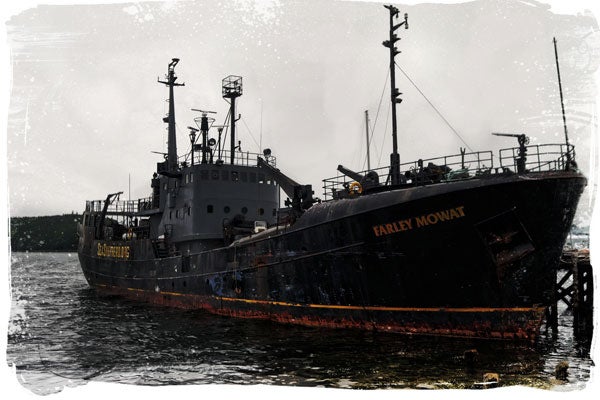
Farley Mowat, Canadian storyteller, activist and icon
Published: May 12, 2014
Canadians across the globe are remembering passionate and prolific author Farley Mowat, renowned for his environmental activism, iconic works of fiction and love of adventure.
"Many Canadians of his generation came to know whole regions of this country because of and through his books,” said Associate Professor Nick Mount, of the Department of English at the University of Toronto. “Our idea of the Canadian North, especially, was largely shaped by Mowat - a place he created in our collective imagination, populated by The People of the Deer, where you learned to Never Cry Wolf or become Lost in the Barrens.”
Mowat, who died at 92, was a U of T alumnus (BA, 1949 from University College) and the recipient, in 1973, of an honorary degree. In 2012, he was named as one of University College’s inaugural “alumni of influence.” The author of such well-known books as Owls in the Family and The Dog Who Wouldn’t Be, Mowat published more than 40 adult's and children's books in a literary career that spanned many decades, winning the Governor General’s Award in 1956 for the novel, Lost in the Barrens.
"Mowat’s great gifts were his passion for his subject matter and his ability to tell riveting, colourful tales, whether he was writing fiction or nonfiction, whether for children or for adults,” said Assistant Professor Robert McGill, who teaches Canadian literature and creative writing.
“The broad appeal of his stories, especially during the key nationalist period of the 1950s and 60s, meant that Mowat was highly influential in shaping popular ideas about Canada—in particular, with regard to Aboriginal peoples, the North, and the natural environment."
A founding member of The Writers’ Union of Canada, Mowat was awarded a lifetime membership in the union in 2007.
"His profile, humour, spirit, and energy were large factors in the creation and early effectiveness of our organization,” TWUC chair Dorris Heffron said in a statement. “He said he would stand on his head in a public square, wearing his kilt, if necessary to promote Canadian Literature. Fortunately, or not, he never found that necessary. Dear Fabulous Farley. He is truly unforgettable."
As news of Mowat’s death spread, Canadians spoke of his passion for the north, for the natural world, and for the country’s First Nations.
“Very sad to hear that Farley Mowat has died,” tweeted CBC Radio host Jian Gomeshi, who later devoted his Q essay to Mowat. “A man who was unafraid to speak out for the Canada he believed in and held dear. RIP Farley.”
An estimated 15 million copies of Mowat's non-fiction and fiction works have been sold across the globe. Along with tales of adventure in Canada’s wilderness, Mowat – who had served in the Second World War - also explored the horrors of battle in a number of works, including the moving memoir And No Birds Sang, published in 1979.
“Mowat’s place and stature on university courses remained wonky throughout his career because his books were not easy to place in academic courses,” said Professor Emeritus Sam Solecki. “His popular novels weren’t strong enough to stand by the side of MacLennan, Richler, Munro and their peers. People of the Deer, The Desperate People and Never Cry Wolf raised ethnographic, political and environmental issues but weren’t quite academic studies. The same point can be made about his books about Russia or the second world war.
"I suspect that his legacy will depend on the fate of those works that turned our attention north, to socio-political and environmental issues that are still with us," Solecki said. "It’s worth keeping in mind that Mowat, like Pierre Berton or Peter C. Newman, didn’t write with an academic readership in mind.
"He was a significant contrarian who knew that his audience was the general public and it was to that public he directed his various concerns.”
 An Officer of the Order of Canada, Mowat was known for speaking his mind on a range of issues; he opposed the seal hunt, decried Canada’s treatment of Aboriginal peoples and was in the news most recently for his opposition to plans to provide wireless Internet service in Canadian parks. Among the many awards he received during his long career were the Stephen Leacock Medal for Humour, the Vicky Metcalfe Award and the Hans Christian Andersen International Award for children's literature and, in 2010, a star on Canada's Walk of Fame (see photo at right by Tabercil via Wikimedia Commons).
An Officer of the Order of Canada, Mowat was known for speaking his mind on a range of issues; he opposed the seal hunt, decried Canada’s treatment of Aboriginal peoples and was in the news most recently for his opposition to plans to provide wireless Internet service in Canadian parks. Among the many awards he received during his long career were the Stephen Leacock Medal for Humour, the Vicky Metcalfe Award and the Hans Christian Andersen International Award for children's literature and, in 2010, a star on Canada's Walk of Fame (see photo at right by Tabercil via Wikimedia Commons).
Controversy dogged him in his later years, as critics took him to task for exaggerating or inventing details in some of his works, blurring the lines between non-fiction and fiction.
“There’s no dispute that Mowat mixed fact and fiction in his work, " said Solecki, "but he did so at a time when many critics and philosophers, following Nietzsche and Derrida, had argued that all statements are fundamentally figurative and therefore unstable in their referentiality, truth is a relative rather than absolute concept, and the lines between genres like fiction and history are porous.
“In retrospect the attack on Mowat’s creative attitude to facts is a short footnote in an era’s shift of attitude. Mowat was probably simultaneously irritated by the attacks and thrilled by the extensive media attention. He was never as simple as he tried to appear to be.”



